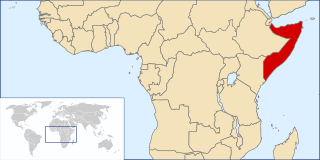
The African Union Mission in Somalia (AMISOM) was a Multinational force formed by the African Union. The operation deployed to Somalia soon after the Islamic Courts Union was deposed by troops from Ethiopia during a large scale invasion in late 2006. The missions primary objective was to maintain the regime change between the ICU and the newly installed Transitional Federal Government, implement a national security plan and train the TFG security forces. As part of its duties, AMISOM later supported the Federal Government of Somalia in its war against Al-Shabaab. AMISOM was the most deadly peacekeeping operation in the post-war era.

United Nations Security Council Resolution 1863, adopted unanimously on January 16, 2009, after recalling resolutions 733 (1992), 751 (1992), 1356 (2001), 1425 (2002), 1519 (2003), 1725 (2006), 1744 (2007), 1772 (2007), 1801 (2008), 1811 (2008), 1814 (2008), 1831 (2008) and 1844 (2008) on the situation in Somalia, the Council its intention to establish a peace-keeping force in war-torn Somalia and called on Secretary-General Ban Ki-moon to develop, by April 15, 2009, a mandate for the proposed mission, which would replace the existing African Union force in the country (AMISOM).
The United Nations Support Office for AMISOM (UNSOA) was a field support operation led by the United Nations Department of Field Support (DFS). It was located in Mogadishu and Nairobi in East Africa, focused on support of the African Union Mission in Somalia (AMISOM).

United Nations Security Council Resolution 1910, adopted unanimously on January 28, 2010, after hearing recommendations from the Secretary-General and recalling resolutions 1325 (2000), 1612 (2005), 1674 (2006), 1738 (2006), 1820 (2008), 1863 (2009), 1882 (2009), 1888 (2009) and 1894 (2009), the Council authorised the mandate of the African Union Mission to Somalia (AMISOM) to be extended until January 31, 2011, asking it to increase its strength to carry out its mandate.

United Nations Security Council resolution 865, adopted unanimously on 22 September 1993, after reaffirming resolutions 733 (1992), 746 (1992), 751 (1992), 767 (1992), 775 (1992), 794 (1992), 814 (1993) and 837 (1993), the Council addressed the process of national reconciliation and political settlement in Somalia, during the civil war.

United Nations Security Council Resolution 1916, adopted unanimously on March 19, 2010, after recalling resolutions 733 (1992), 1519 (2003), 1558 (2004), 1587 (2004), 1630 (2005), 1676 (2006), 1724 (2006), 1744 (2007), 1766 (2007), 1772 (2007), 1801 (2008), 1811 (2008), 1844 (2008), 1853 (2008), 1862 (2009), 1894 (2009) and 1907 (2009), the Council extended the term of the Monitoring Group for 12 months and expanded its mandate to include the monitoring of the arms embargo on Eritrea in addition to Somalia.

United Nations Security Council resolution 1071, adopted unanimously on 30 August 1996, after recalling all resolutions on the situation in Liberia, particularly Resolution 1059 (1996), the Council extended the mandate of the United Nations Observer Mission in Liberia (UNOMIL) until 30 November 1996 and discussed matters relating to UNOMIL.

United Nations Security Council resolution 1089, adopted unanimously on 13 December 1996, after recalling all resolutions on the situation in Tajikistan and the Tajik-Afghan border, the Council extended the mandate of the United Nations Mission of Observers in Tajikistan (UNMOT) until 15 March 1997 and addressed efforts to end the conflict in the country.
United Nations Security Council Resolution 1935, adopted unanimously on July 30, 2010, after reaffirming all previous resolutions and statements on the situation in Sudan, the Council extended the mandate of the African Union – United Nations Hybrid Operation in Darfur (UNAMID) for a further 12 months until July 31, 2011 and demanded an end to fighting and attacks on United Nations personnel and civilians.

United Nations Security Council resolution 1528, adopted unanimously on 27 February 2004, after recalling resolutions 1464 (2003), 1479 (2003), 1498 (2003), 1514 (2003) and 1527 (2004) on the situation in Côte d'Ivoire, the council established the United Nations Operation in Côte d'Ivoire (UNOCI) for an initial period of twelve months.

United Nations Security Council Resolution 1962, adopted unanimously on December 20, 2010, after recalling previous resolutions on the situation in Côte d'Ivoire, including resolutions 1893 (2009), 1911 (2010), 1924 (2010), 1933 (2010), 1942 (2010), 1946 (2010) and 1951 (2010), the Council extended the mandate of the United Nations Operation in Côte d'Ivoire (UNOCI) until June 30, 2011 and urged all Ivorian parties to respect the outcome of the presidential election and the recognition of Alassane Ouattara as president.

United Nations Security Council Resolution 1964, adopted unanimously on December 22, 2010, after recalling previous resolutions on the situation in Somalia, the Council authorised the continuation of the mandate of the African Union Mission to Somalia (AMISOM) until September 30, 2011, and increased its size from 8,000 to 12,000 personnel.

United Nations Security Council Resolution 1725, adopted unanimously on December 6, 2006, after recalling previous resolutions on the situation in Somalia, particularly resolutions 733 (1992), 1356 (2001) and 1425 (2002), the Council authorised the Intergovernmental Authority on Development (IGAD) and African Union to establish a protection and training mission in the country.

United Nations Security Council Resolution 2010 was unanimously adopted on 30 September 2011.

United Nations Security Council Resolution 1744, adopted unanimously on 20 February 2007, authorizing the African Union mission replacing and subsuming the IGAD Peace Support Mission in Somalia or IGASOM, which was a proposed Intergovernmental Authority on Development protection and training mission to Somalia approved by the African Union on 14 September 2006. IGASOM was also approved by the United Nations Security Council on 6 December 2006.

United Nations Security Council Resolution 1801 was unanimously adopted on 20 February 2008.

United Nations Security Council Resolution 1814 was unanimously adopted on 15 May 2008. The resolution called for the United Nations to provide economic, political and technical support to Somalia, with a possible UN peacekeeping force.

United Nations Security Council Resolution 1831 was unanimously adopted on 19 August 2008.

United Nations Security Council Resolution 2093 was unanimously adopted on 6 March 2013.

The United Nations Assistance Mission in Somalia (UNSOM) was a special political mission of the United Nations Department of Political and Peacebuilding Affairs. Its primary purpose was to assist the Federal Government of Somalia in achieving peace, stability and reconciliation. It worked closely with and supported the work of the African Union Mission in Somalia (AMISOM) and the African Union Transition Mission in Somalia.














